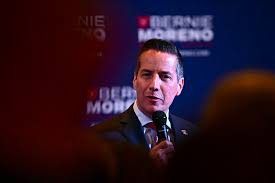
COLUMBUS, Ohio — Donald Trump got what he wanted when former car dealer Bernie Moreno won the Republican Senate primary in Ohio.
So did Democrats. Moreno’s positions on abortion, immigration and Trump’s election lies make the Republican less electable this fall, Democrats believe, in the race against Democratic Sen. Sherrod Brown. Democrats actually ran ads in the GOP primary’s closing days boosting the Trump-backed Moreno over more moderate alternatives.
Yet it was Trump who may have cheered the loudest in the wake of Moreno’s victory Tuesday night.
“THANK YOU, OHIO — MAGA,” Trump wrote on social media, referencing his “Make America Great Again” movement. He shared another post that declared, “Trump reigns supreme in OH.”
Moreno stands as the latest proxy in the Republican Party’s wrestling match between Trumpism and more traditional conservatives. Even after underwhelming Republican performances in three consecutive national elections under Trump’s watch, the former president and his allies have been unrelenting in their fight against any GOP candidate who does not wholly embrace Trump’s wishes.
In 2024, Trump and his movement are winning the Republican tug of war again, despite the general election risks. Just last week, Trump secured a third consecutive nomination after dominating primary contests from New Hampshire and Nevada to North Dakota, even with his legal baggage. Besides Moreno in Ohio, Trump loyalists have emerged in key races in other states, including Arizona, where Kari Lake is the GOP’s hope to flip a Senate seat.
Trump’s reach has extended into the Washington headquarters of the Republican Party, where he has installed his daughter-in-law and a campaign lieutenant to take over the Republican National Committee.
Republican officials privately worry there could be serious implications in the broader fight for control of Congress, where Republicans are clinging to a razor-thin House majority and seem in position to retake the Senate.
Democrats are defending seats in Montana and West Virginia, Republican strongholds. On paper, Democrats have a better chance to hold Brown’s seat in Ohio, which has shifted sharply right in recent years. Moreno may have been the Democrats’ preferred candidate, but the general election is considered a toss-up and Brown will be among the nation’s most vulnerable Senate Democrats in November.
Republican Gov. Mike DeWine and former Sen. Rob Portman campaigned against Moreno, arguing that moderate Matt Dolan, a wealthy state senator whose family owns baseball’s Cleveland Guardians, was a better choice. Also in the race was Secretary of State Frank LaRose.
“Some people had preferences, obviously, but it doesn’t mean that Moreno can’t win,” said Republican strategist Chris Hartline. “Ohio is not what it used to be.”
David Bergstein, spokesman for the Senate Democrats’ campaign organization, suggested that the primary result puts Brown “in the strongest possible position to win.”
Trump campaigned alongside Moreno in the election’s closing days while Dolan tried to consolidate the party’s non-Trump faction. Trump also endorsed a congressional candidate, state Rep. Derek Merrin, who won his primary.
Moreno, in his election night speech in Cleveland, called for party unity while praising Trump. Moreno also hinted about the tenor of the fall campaign against Brown with a pledge to “retire the old commie.”
Brown responded with a brief statement on X, the platform formerly known as Twitter: “The choice ahead of Ohio is clear: Bernie Moreno has spent his career and campaign putting himself first, and would do the same if elected. I’ll always work for Ohio.”
In paid advertising before the primary, Moreno had embraced Trump’s lies about the 2020 election he lost to Democrat Joe Biden.
“President Trump says the election was stolen and he’s right,” Moreno said in one digital ad.
Yet Democratic strategists are even more focused on what they see as Moreno’s baggage, both personal and political.
Moreno, a former luxury car dealer and blockchain entrepreneur, has described himself as “100% pro-life no exceptions,” During the primary campaign, he said he would favor the federal government imposing restrictions on abortions at 15 weeks, with “commonsense restrictions,” — limits that would substantially counter Ohio voters’ decision in November to enshrine in the state constitution an individual’s right to make their own reproductive decisions.







